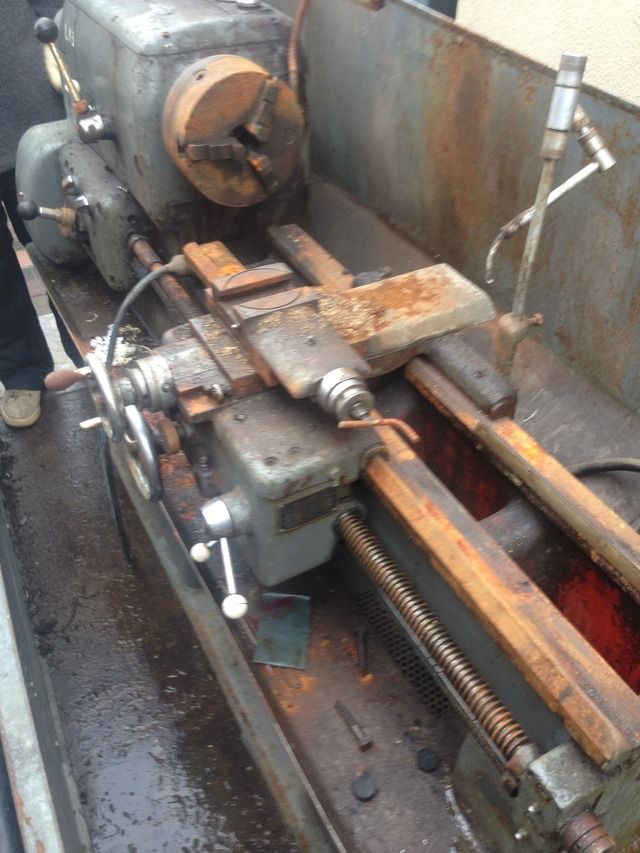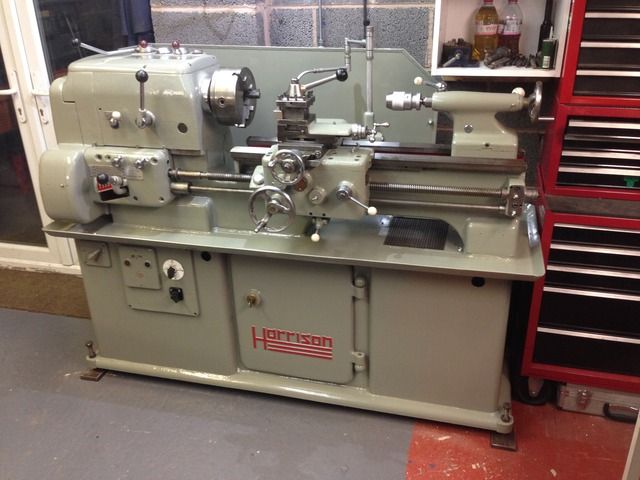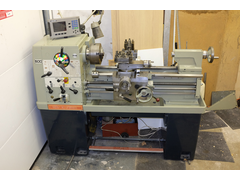



I'm looking at upgrading my lathe from my current ML7, and quite like the idea of the Colchester Student.
Problem is transporting them, does anyone know how easy they are to break down into liftable parts to fit in the back of the pickup? I have no heavy
lifting kit at home, just a chain block.
Also, has anyone goy a lead on one for sale, I know there are a couple on eBay at the moment, but occasionally folk on here have known of machines for
sale.
Cheers.
Pete.
I appreciate it may not be possible....but if it is I'd certainly be tempted to keep the myford and buy the colchester as a 2nd lathe.
I started out with a colchester student and don't get me wrong, it's a fantastic machine, but for smaller stuff I ended up buying a myford
super7 as well which is the best machine for doing the smaller stuff.
The colchester has a large threaded hole around the area directly under the chuck (from memory).....this is the balance point for a lifting eye to
screw in. I was fortunate as I had a friend with a hi-ab flat-bed which we used for transport.
I have a student. Picked it up with a Luton van. Loaded with a forklift and then I took some of the heavy bits off, motor, saddle etc. then used the tail lift of the van plus hydraulic car jacks and pieces of wood to lower it to th floor. Then moved it into place using a large engine crane. It's a heavy beast but has done well, from small bits to big bits.
I've moved a few decent sized lathes with no lifting equipment, some are easier than others. Stripping would be a last resort for me, Harrison
which is the same family as Colchester recommend never removing the bed from the cabinet stand.
Older Harrison's are easy to run on rollers as the cabinet base is full length. With two sturdy planks and a gap in the middle it's possible
to nail a length of steel to the end attach your block and tackle and pull the lathe up on rollers until it tips on to the vehicle bed. Dead easy with
a van or trailer but of course a pickup bed will be higher so great care would be needed as lathes are top heavy and always want to fall over.
Never moved an older student, so not sure how the cabinets are constructed. Later models such as the 1800 are a pain in the arse as the cabinet is two
separate ends with a gap in the middle making rolling almost impossible . Easiest way would be to make a heavy angle frame with wheels and sit the
lathe in using an engine crane or similar. Later students are also bloody heavy compared to older Harrison's etc don't underestimate moving
one.
I would be tempted to forget the pickup and hire a flat bed trailer and a big engine crane it is probably the safest way to do it yourself.
I have an old Colchester Student - the official way to move it is to screw a big eye-bolt into a threaded hole in the bed and hoist it from that. The
lathe balances perfectly from this point when the tailstock is at the end of its travel. I got a local machinery moving company to move mine across
town on a lorry with a Hiab lifting arm, and I'm glad I did as the beast weighs slightly more than my Locost (cost me £100).
You could do quite a bit of dismantling - the headstock and tailstock come off but the headstock in particular is massive, full of oil, difficult to
undo and you also run the risk of messing up the alignment. Even with those off, the bed plus cabinet is still a big bit of metal to move around.
When complete the lathe is also quite top-heavy when not sitting firmly on the ground, so has to be handled carefully - I wouldn't like to think
of the damage it would cause if it fell over!
I moved my with an engine crane and a horse trailer.
i brought a 1200KG Harrison not long ago, the chap i had it off dropped it on my trailer, when i got it home i stripped it and carried all the bits
into my workshop where i refurbished everything and rebuild it, if its flat to your garage rollers would be the way as said above



quote:
Originally posted by Rosco86


I shifted a Colchester Master with the covered car trailer and an engine hoist. The chap I bought it from lifted one end onto the rear of the trailer
and supported the other end with the forklift. I then winched it in with the car winch with the car and trailer brakes off.
At home the reverse applied. I lifted the end nearest the door with my engine hoist and drove the car out of the garage ( very slowly  ).
).
Just before it was due to drop off the end I swopped the engine hoist for a pile of blocks and lifted the end clear of the trailer with the engine
hoist and drove away.
From then on just a matter of pinch bars and rollers.
Easy Peasy - but stressful IIRC.
PS Rosco 86 can come renovate my lathe any day - amazing job! How did you polish up the slides on the bed are they remachined?
Cheers!
Thanks for all the advive guys.
Rosco, that machine looks superb, I'minterested too, how you polished it all up....
I've got a brass wire wheel on a bench grinder, 6" I think, I use this for everything I can pick up to clean, works amazing! As for the lathe bed, it's hardened so it would take quite a while for the rust to do some damage, but I just used wire wool and wd40 then a bit of scotch brite, it's not perfect, but good enough for a working machine
I have a Harrison l5 same as the one above, it was forklifted on to my trailer, engine crane to lift off then on to some trolley wheel/states to move
about.
Harrison is supposed to be the upmarket model compared to Colchester, my old l5 was £500 with chucks, face plate and change wheels, it may be 50 years
old but runs very true.
The Colchester Student was only meant to be a light beginner's lathe, for colleges and schools - but it's still a massive lump of steel and cast iron! It was never meant to be any sort of production lathe (although many companies used them for 'real work' ). A Myford 7 looks like a toy alongside it.
Hmm, I'm guessing these are all 3 phase machines?
I'd quite like one if they can be had around £500...
Only got single phase. And no space really, but in time!
Yeah most are three phase unless converted, i brought a brand new single phase motor for £120, now runs off a 13amp plug
quote:
Originally posted by Rosco86
Yeah most are three phase unless converted, i brought a brand new single phase motor for £120, now runs off a 13amp plug

Yeah, ive wired in a reverse switch, it switches the windings over on the motor, yeah its quite handy if your tapping a thread, also sometimes it easier to reverse when screw cutting instead of disengaging the feed
Same here, discarded the 3 phase motor for single phase, it runs slightly faster a bonus and used a switch to alter the strapping so it can run in
reverse, just budget an extra £150 to convert.
If possible you want one with the norton screw cutting box (as in Rosco's photo's) and the 127 tooth metric conversion gear, they use
tapered bearings so unless it is really worn you can take up any slack in the headstock easily.
Once you have a lathe you quickly find work for it, as these old Harrison's are relatively large for home use although do not take up a lot more
room compared to a smaller model. They can double as a horizontal mill, the vertical slides pop up on eBay from time to time, for my £500 notes it
came with all of this and a deviding head so get one as many bits with it as you can. It's worth travelling for the right machine as it is a once
in a lifetime journey, you will never wear it out.
Regards Mark
I've got a Harrison L9, got it from Durham college, used a engine crane and my box trailer...
Cut my teeth on a Boxford at school and the colliery so didn't want anything smaller.
It was 3 phase, bought a 3hp motor from machine mart and it runs ok off a 13amp plug. Its got reverse on the gearbox so easy wiring up the motor one
way.
He had a big upright milling machine as well and I wish I'd had the room!!!!
[Edited on 18/7/15 by coozer]
I've gone for an inbetween size with a Boxford Aud. that's still well over 200kg to shift.
15 years ago all three phase lathes went for penny's. It's a different matter now inverters are so cheap.
I hate to think how many where scrapped when the price of steel was high 
[Edited on 18/7/15 by big_wasa]
This is my current lathe, Colchester Student 1800, 3 phase but runs from an inverter, which gives the advantage of variable speed control and built in
E stop. I also fitted a DRO which is a useful addition.
Think the quoted weight for these is approx 800kg, certainly feels a lot heavier than my old Harrison L5a


Description
quote:
Originally posted by Wadders
This is my current lathe, Colchester Student 1800, 3 phase but runs from an inverter, which gives the advantage of variable speed control and built in E stop. I also fitted a DRO which is a useful addition.
Think the quoted weight for these is approx 800kg, certainly feels a lot heavier than my old Harrison L5a
Description
Originally posted by coozer
quote:
Originally posted by Wadders
This is my current lathe, Colchester Student 1800, 3 phase but runs from an inverter, which gives the advantage of variable speed control and built in E stop. I also fitted a DRO which is a useful addition.
Think the quoted weight for these is approx 800kg, certainly feels a lot heavier than my old Harrison L5a
Description

Just spotted this on a Homeworkshop, not checked how much they are new but it looks like a lot of lathe for the money....
http://www.homeworkshop.org.uk/index.php?option=com_adsmanager&view=show_ad&adid=23777&catid=2